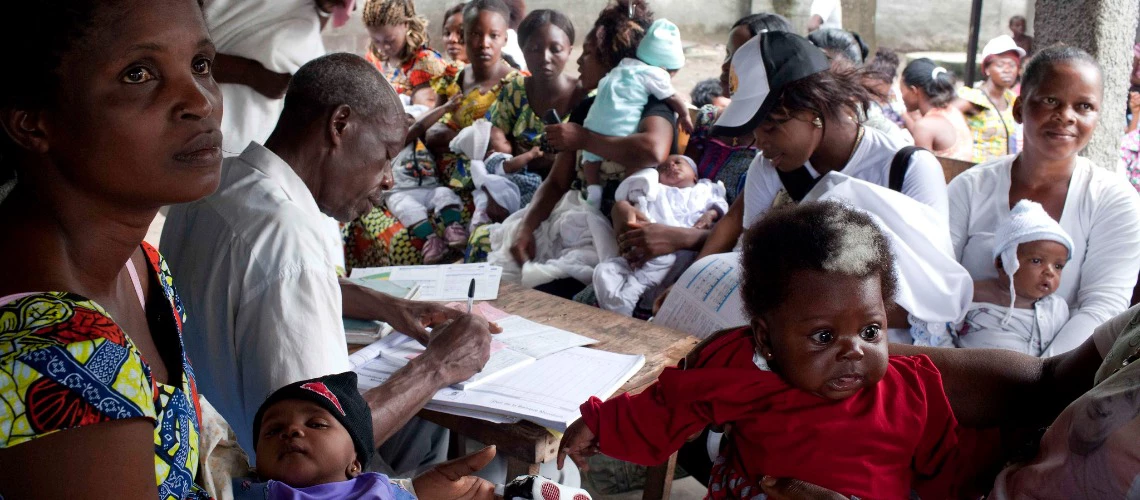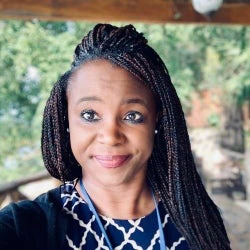 Kinshasa, Democratic Republic of Congo. Community worker, Mukendi Clement (center left) helps document the weight and growth of children at the Marechal Health Center in Kinshasa, DRC. Photo © Dominic Chavez/World Bank.
Kinshasa, Democratic Republic of Congo. Community worker, Mukendi Clement (center left) helps document the weight and growth of children at the Marechal Health Center in Kinshasa, DRC. Photo © Dominic Chavez/World Bank.
Our work on social protection, health and nutrition in the Democratic Republic of the Congo (DRC) offers promising examples of how people’s human capital—their health, education and skills—can be improved even during protracted humanitarian crises.
The DRC has experienced one of the most complex and longest humanitarian crises in the world. The escalation of the active armed conflict in the Eastern provinces has led to increased food insecurity, decreased access to housing, health and education services and other basic needs. Seventy percent of the people live in poverty and 6.9 million are internally displaced with close to 600,000 refugees and asylum-seekers. Only 37 percent of children will achieve their full human capital by age 18.
The World Bank’s funding to address the crisis of human development in the DRC focused on assistance to vulnerable communities including internally displaced people, refugees and host communities, with the goal of protecting and building human capital. The implementation of multiple initiatives has shown us how humanitarian and development agendas can work hand in hand to support people in the short term while boosting their human capital in the long term.
One lesson learned in doing this work was the importance of enhanced coordination and intentional dialogue between humanitarian and development partners, coupled with increased engagement with UN agencies, civil society, government, and other relevant stakeholders. A shift from a siloed approach towards a more coordinated approach requires additional sectoral collaboration and the building of institutional capacities to ensure effective program implementation.
Through the Eastern Recovery Project (STEP) nearly 71,000 people—both refugees from Central African Republic and host community members—received social assistance and social services in the North and South Ubangi provinces since 2021. This could not have happened without coordination with UNHCR, the government’s National Commission for Refugees and the DRC Social Fund. Each organization shared data that helped map the areas with high concentrations of refugees. We also implemented joint communication campaigns to spread the word about the available assistance for affected people.
The STEP project also promoted the transition of refugees and host communities from short-term emergency support toward development programs. This happened through the construction of schools and health centers and proved critical to enhancing living conditions and increasing people’s access to basic social services.
Another example in the DRC sheds light on the importance of prioritizing human capital outcomes in fragile and conflict affected settings. Doing so helps facilitate territorial stability, build social cohesion, and ensure social inclusion.
In 2018 an unprecedented Ebola virus outbreak affected the provinces of North Kivu, Ituri and South Kivu, all of which had extremely high numbers of internally displaced people, with active conflict and presence of hundreds of armed groups. The World Bank and other donors provided significant financing to support a multisectoral response to control the outbreak. Due to continued unmet needs in affected vulnerable communities, people needed access to care. The Health System Strengthening for Better Maternal and Child Health Results Project (PDSS) expanded its health service delivery interventions to 13 health zones in the Province of North Kivu. This allowed for the rehabilitation of targeted health facilities, free health services to vulnerable populations, and regular medication provision.
To ensure better access to care for internally displaced people, the World Bank supported an active dialogue between the United Nations (UN) Health Cluster, the UN Office for the Coordination of Humanitarian Affairs, and humanitarian donors. This led to the inclusion of internally displaced people as part of vulnerable groups to receive free health services. This allowed for 318,000 internally displaced people to benefit from free health services. These interventions and investments were critical in strengthening vulnerable populations’ access to basic services and ensuring that the human capital of the internally displaced people was strengthened.
These examples show that improving the human capital of people during crisis times is possible, but a coordinated and integrated approach is required. Economic opportunities, social protection, better health and nutrition, and access to education are all pieces of the same puzzle.






Join the Conversation